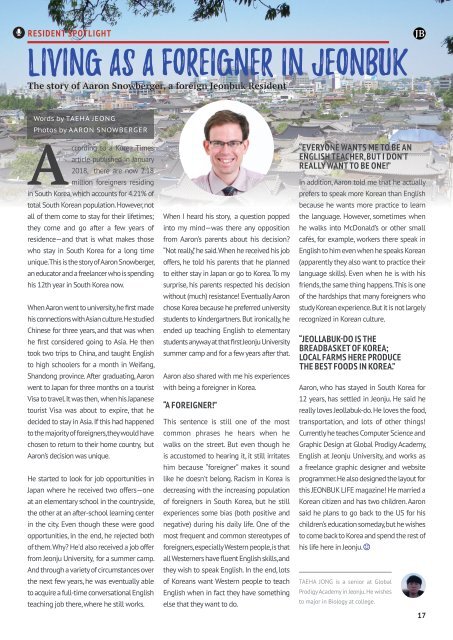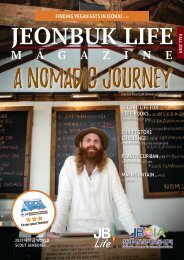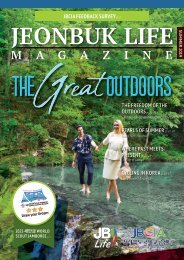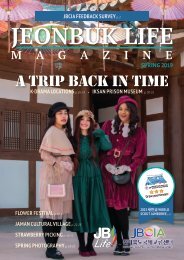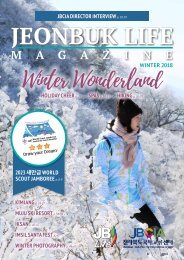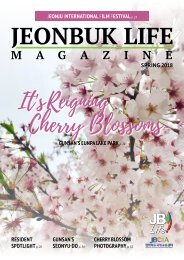Create successful ePaper yourself
Turn your PDF publications into a flip-book with our unique Google optimized e-Paper software.
Resident Spotlight<br />
Living as a foreigner in Jeonbuk<br />
The story of Aaron Snowberger, a foreign Jeonbuk Resident<br />
Words byTaeha Jeong<br />
Photos byAaron Snowberger<br />
According to a Korea Times<br />
article published in January<br />
<strong>2018</strong>, there are now 2.18<br />
million foreigners residing<br />
in South Korea, which accounts for 4.21% of<br />
total South Korean population. However, not<br />
all of them come to stay for their lifetimes;<br />
they come and go after a few years of<br />
residence—and that is what makes those<br />
who stay in South Korea for a long time<br />
unique. This is the story of Aaron Snowberger,<br />
an educator and a freelancer who is spending<br />
his 12th year in South Korea now.<br />
When Aaron went to university, he first made<br />
his connections with Asian culture. He studied<br />
Chinese for three years, and that was when<br />
he first considered going to Asia. He then<br />
took two trips to China, and taught English<br />
to high schoolers for a month in Weifang,<br />
Shandong province. After graduating, Aaron<br />
went to Japan for three months on a tourist<br />
Visa to travel. It was then, when his Japanese<br />
tourist Visa was about to expire, that he<br />
decided to stay in Asia. If this had happened<br />
to the majority of foreigners, they would have<br />
chosen to return to their home country, but<br />
Aaron’s decision was unique.<br />
He started to look for job opportunities in<br />
Japan where he received two offers—one<br />
at an elementary school in the countryside,<br />
the other at an after-school learning center<br />
in the city. Even though these were good<br />
opportunities, in the end, he rejected both<br />
of them. Why? He'd also received a job offer<br />
from Jeonju University, for a summer camp.<br />
And through a variety of circumstances over<br />
the next few years, he was eventually able<br />
to acquire a full-time conversational English<br />
teaching job there, where he still works.<br />
When I heard his story, a question popped<br />
into my mind—was there any opposition<br />
from Aaron’s parents about his decision?<br />
“Not really,” he said. When he received his job<br />
offers, he told his parents that he planned<br />
to either stay in Japan or go to Korea. To my<br />
surprise, his parents respected his decision<br />
without (much) resistance! Eventually Aaron<br />
chose Korea because he preferred university<br />
students to kindergartners. But ironically, he<br />
ended up teaching English to elementary<br />
students anyway at that first Jeonju University<br />
summer camp and for a few years after that.<br />
Aaron also shared with me his experiences<br />
with being a foreigner in Korea.<br />
“A Foreigner!”<br />
This sentence is still one of the most<br />
common phrases he hears when he<br />
walks on the street. But even though he<br />
is accustomed to hearing it, it still irritates<br />
him because “foreigner” makes it sound<br />
like he doesn't belong. Racism in Korea is<br />
decreasing with the increasing population<br />
of foreigners in South Korea, but he still<br />
experiences some bias (both positive and<br />
negative) during his daily life. One of the<br />
most frequent and common stereotypes of<br />
foreigners, especially Western people, is that<br />
all Westerners have fluent English skills, and<br />
they wish to speak English. In the end, lots<br />
of Koreans want Western people to teach<br />
English when in fact they have something<br />
else that they want to do.<br />
“Everyone wants me to be an<br />
English teacher, but I don’t<br />
really want to be one!”<br />
In addition, Aaron told me that he actually<br />
prefers to speak more Korean than English<br />
because he wants more practice to learn<br />
the language. However, sometimes when<br />
he walks into McDonald’s or other small<br />
cafés, for example, workers there speak in<br />
English to him even when he speaks Korean<br />
(apparently they also want to practice their<br />
language skills). Even when he is with his<br />
friends, the same thing happens. This is one<br />
of the hardships that many foreigners who<br />
study Korean experience. But it is not largely<br />
recognized in Korean culture.<br />
“Jeollabuk-do is the<br />
breadbasket of Korea;<br />
local farms Here Produce<br />
the best Foods in Korea.”<br />
Aaron, who has stayed in South Korea for<br />
12 years, has settled in Jeonju. He said he<br />
really loves Jeollabuk-do. He loves the food,<br />
transportation, and lots of other things!<br />
Currently he teaches Computer Science and<br />
Graphic Design at Global Prodigy Academy,<br />
English at Jeonju University, and works as<br />
a freelance graphic designer and website<br />
programmer. He also designed the layout for<br />
this JEONBUK <strong>LIFE</strong> magazine! He married a<br />
Korean citizen and has two children. Aaron<br />
said he plans to go back to the US for his<br />
children’s education someday, but he wishes<br />
to come back to Korea and spend the rest of<br />
his life here in Jeonju. <br />
TAEHA JONG is a senior at Global<br />
Prodigy Academy in Jeonju. He wishes<br />
to major in Biology at college.<br />
17


